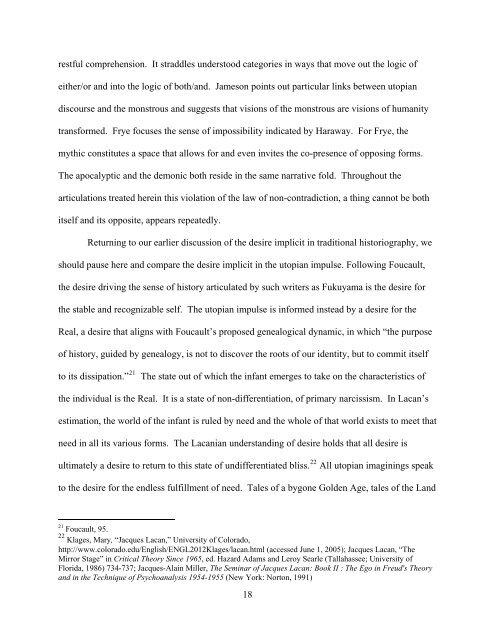A Genealogy of the Extraterrestrial in American Culture
A Genealogy of the Extraterrestrial in American Culture
A Genealogy of the Extraterrestrial in American Culture
You also want an ePaper? Increase the reach of your titles
YUMPU automatically turns print PDFs into web optimized ePapers that Google loves.
estful comprehension. It straddles understood categories <strong>in</strong> ways that move out <strong>the</strong> logic <strong>of</strong><br />
ei<strong>the</strong>r/or and <strong>in</strong>to <strong>the</strong> logic <strong>of</strong> both/and. Jameson po<strong>in</strong>ts out particular l<strong>in</strong>ks between utopian<br />
discourse and <strong>the</strong> monstrous and suggests that visions <strong>of</strong> <strong>the</strong> monstrous are visions <strong>of</strong> humanity<br />
transformed. Frye focuses <strong>the</strong> sense <strong>of</strong> impossibility <strong>in</strong>dicated by Haraway. For Frye, <strong>the</strong><br />
mythic constitutes a space that allows for and even <strong>in</strong>vites <strong>the</strong> co-presence <strong>of</strong> oppos<strong>in</strong>g forms.<br />
The apocalyptic and <strong>the</strong> demonic both reside <strong>in</strong> <strong>the</strong> same narrative fold. Throughout <strong>the</strong><br />
articulations treated here<strong>in</strong> this violation <strong>of</strong> <strong>the</strong> law <strong>of</strong> non-contradiction, a th<strong>in</strong>g cannot be both<br />
itself and its opposite, appears repeatedly.<br />
Return<strong>in</strong>g to our earlier discussion <strong>of</strong> <strong>the</strong> desire implicit <strong>in</strong> traditional historiography, we<br />
should pause here and compare <strong>the</strong> desire implicit <strong>in</strong> <strong>the</strong> utopian impulse. Follow<strong>in</strong>g Foucault,<br />
<strong>the</strong> desire driv<strong>in</strong>g <strong>the</strong> sense <strong>of</strong> history articulated by such writers as Fukuyama is <strong>the</strong> desire for<br />
<strong>the</strong> stable and recognizable self. The utopian impulse is <strong>in</strong>formed <strong>in</strong>stead by a desire for <strong>the</strong><br />
Real, a desire that aligns with Foucault’s proposed genealogical dynamic, <strong>in</strong> which “<strong>the</strong> purpose<br />
<strong>of</strong> history, guided by genealogy, is not to discover <strong>the</strong> roots <strong>of</strong> our identity, but to commit itself<br />
to its dissipation.” 21<br />
The state out <strong>of</strong> which <strong>the</strong> <strong>in</strong>fant emerges to take on <strong>the</strong> characteristics <strong>of</strong><br />
<strong>the</strong> <strong>in</strong>dividual is <strong>the</strong> Real. It is a state <strong>of</strong> non-differentiation, <strong>of</strong> primary narcissism. In Lacan’s<br />
estimation, <strong>the</strong> world <strong>of</strong> <strong>the</strong> <strong>in</strong>fant is ruled by need and <strong>the</strong> whole <strong>of</strong> that world exists to meet that<br />
need <strong>in</strong> all its various forms. The Lacanian understand<strong>in</strong>g <strong>of</strong> desire holds that all desire is<br />
ultimately a desire to return to this state <strong>of</strong> undifferentiated bliss. 22 All utopian imag<strong>in</strong><strong>in</strong>gs speak<br />
to <strong>the</strong> desire for <strong>the</strong> endless fulfillment <strong>of</strong> need. Tales <strong>of</strong> a bygone Golden Age, tales <strong>of</strong> <strong>the</strong> Land<br />
21 Foucault, 95.<br />
22 Klages, Mary, “Jacques Lacan,” University <strong>of</strong> Colorado,<br />
http://www.colorado.edu/English/ENGL2012Klages/lacan.html (accessed June 1, 2005); Jacques Lacan, “The<br />
Mirror Stage” <strong>in</strong> Critical Theory S<strong>in</strong>ce 1965, ed. Hazard Adams and Leroy Searle (Tallahassee; University <strong>of</strong><br />
Florida, 1986) 734-737; Jacques-Ala<strong>in</strong> Miller, The Sem<strong>in</strong>ar <strong>of</strong> Jacques Lacan: Book II : The Ego <strong>in</strong> Freud's Theory<br />
and <strong>in</strong> <strong>the</strong> Technique <strong>of</strong> Psychoanalysis 1954-1955 (New York: Norton, 1991)<br />
18















